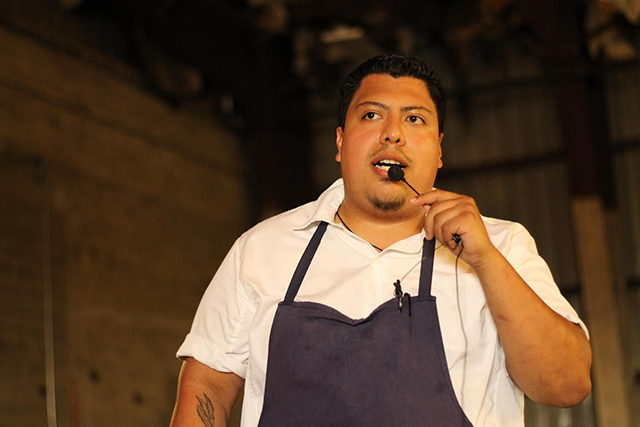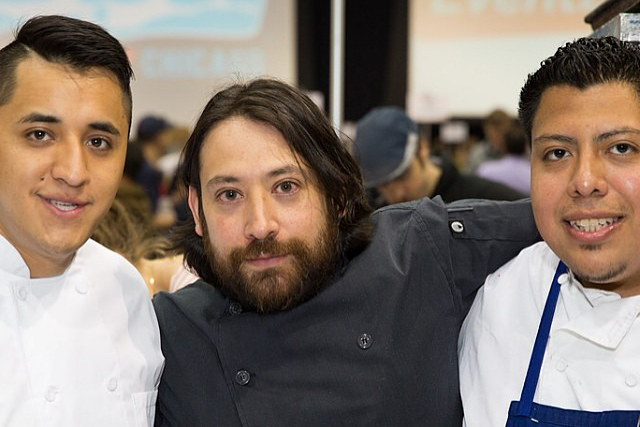Introductions: Daniel Espinoza Wants To Be The Next Michelin-Starred Mexican Chef
By Melissa McEwen in Food on Dec 12, 2014 9:30PM

DanielEspinoza describes his dishes to the diners at a Dinner Lab dinner (Image courtesy Dinner Lab)
Dinner Lab is a “social dining experiment” hosting pop-up meals across the country. But another thing they do is incubate the careers of talented up and coming chefs. And one of them is Chicago’s own Daniel Espinoza, who grew up in Humboldt Park and still lives there, though Dinner Lab has him cooking dinners across the country.
Espinoza’s cuisine is firmly rooted in his Mexican heritage. “if I can serve it to my grandmother and she can be happy with it, I’m happy. A lot of the food I’m doing is based on childhood memories. ” he says.
Espinoza praises both Mexique, where he worked for three years, and Dinner Lab for their willingness to consider people who haven’t worked at what he calls “the places” i.e. Michelin-starred fine dining restaurants. When we asked him who he thought we should be watching he pointed to Frank Valdez, a native of Chicago’s South Side who beat out several people with more conventionally impressive resumes to earn the position of sous chef at Mexique. Valdez is leaving Mexique to open a restaurant called Son Of A Butcher in Logan Square. Espinoza describes Valdez’s food as “thoughtful, whimsical, and smart. He’s doing Mexican with French influences, but he wants to think outside the box and is not afraid to throw in some other influences as long as they taste good and make sense. ”

Harol Mendieta, Frank Valdez, and Daniel Espinoza (Baconfest/Ben Collins-Sussman)
Mexique is unfortunately also known for earning a surprise Michelin star and then losing it within a year. “I was heartbroken, I worked for three years there and made so many connections and relationships…We nurtured all the interns we had there. Frank told us any kitchen you go into, the way the chef slices onions, you slice them better” says Espinoza. And unlike many other kitchen environment he says it was “not demeaning, there was no screaming.” Espinoza speculates that Chef Gaytan being wrapped up in the media, particularly Top Chef, might have caused the star loss.
We asked why Chicago, despite a vibrant Mexican food scene, doesn’t seem to have incubated very many Mexican food professionals getting larger attention. One of Chicago’s most visible representatives of Mexican food is Rick Bayless, who is not of Mexican heritage. Espinoza says part of it is people being too shy and might not realize how awesome their own food is, another is education.
Espinoza himself almost didn’t go to college, but is glad he did. “I started working in restaurants when I was 16 and honestly thought I’d never go to college. But my mother wanted me to go to school because she never could, she knocked some sense into me. I think about how smart my mother is and what she could have become if she had. So I went to CIA for three months and then ended up at Kendell.”
Espinoza also credits a French influence in his cooking and spent some time cooking in southern France. He says many Mexican chefs are drawn to French food because of the long history of cross-cultural exchange and because there are “so many similarities. Creme caramel is really so much like flan. Carnitas is similar to confit.”
He also recognizes the value in adapting the cuisine to an audience. We discussed an issue that Mexican restaurants seem to encounter in Chicago, which is that customers order chicharrones expecting something like crispy pork rinds and instead they get something more gelatinous, which is not always a welcome surprise. “At Dinner Lab I served pickled pork skin and called it bacon relish. It had cotija, popcorn, tomatillo, serranos, and I served it to people and they loved it. After that I went out and told them what it was.”
Dinner Lab also provides coaching based on the feedback cards Dinner Lab diners fill out after every dinner. “My lowest score was a beet salad and people described the vinaigrette as ‘muddy’. When we discussed that I realized it was caused by the pepitas I added to it, I fixed it and the scores went way up. I like that- we literally dissect each meal course by course and take two steps back.”
It’s a wide departure from much of the fine dining world, where even constructive criticism is often treated like a grave insult. Because of that Espinoza staffs his own team with people who also may not have traditional fine dining backgrounds, but who are eager and willing to “make things happen.”
Dinner Lab’s incubation of up and coming chefs isn’t just providing coaching and venues for cooking, they also plan to help them open their own restaurants. To decide which of their chefs will be the first for this project they sent them on tour this year and narrowed down the field based on diner feedback. Espinoza is one of three finalists. They are getting ready to present their restaurant ideas to investors. “My goal is to be a Michelin Mexican chef doing Mexican [cuisine], that’s my culture” he says.
Introductions highlights some of Chicago’s most interesting people working with food and drink and also to turn the question to them and ask them who they think we should be watching. This is the first in the series.